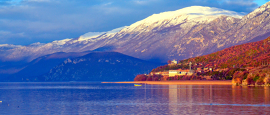Albania: Doing business & staying in touch
Doing business in Albania
Punctuality is valued, so arriving on time for meetings is advisable, even though local counterparts may occasionally be late. It's customary to exchange business cards during introductions, and initial meetings often focus on relationship-building rather than immediate business discussions, reflecting the importance Albanians place on personal connections.
Gift-giving is a significant aspect of Albanian business culture. Presenting a small, thoughtful gift, particularly items representative of your home country, is appreciated and seen as a gesture of goodwill. However, avoid gifts that could be perceived as overly extravagant or as bribes.
Albanians appreciate directness balanced with respect. They may be frank in their exchanges but always maintain a level of formality, especially with superiors. Non-verbal cues, such as maintaining eye contact, are important and convey sincerity. Please note that in some regions, nodding may indicate disagreement, while shaking the head can signify agreement, which can be confusing; therefore, seeking verbal confirmation is prudent.
Albania has made remarkable progress in its economic development, transitioning from one of Europe's poorest nations to an upper-middle-income country. The economy is diversified, with services making up the largest share, particularly in sectors like tourism, telecommunications, and retail. Agriculture continues to play a vital role, employing a significant portion of the population and producing fruits, vegetables, and livestock for both domestic use and export. The industrial sector is also prominent, encompassing mining, textiles, and energy production, with natural resources such as oil and minerals contributing to the country's economic base.
Tourism has emerged as a key growth driver, with Albania's stunning landscapes, historical sites, and Adriatic coastline attracting an increasing number of international visitors. Construction and infrastructure projects have further supported the economy, as the country works to modernise its transportation networks and urban centres. Albania's strategic location in the Western Balkans positions it as an emerging trade and investment hub, with ongoing reforms aimed at improving the business environment and aligning the nation with European Union standards.
While the economy has seen consistent growth, challenges remain. The government continues to focus on structural reforms, reducing unemployment, and addressing regional disparities.
Keeping in Touch in Albania
Albania has two major mobile operators, Vodafone Albania and One Albania, both of which provide reliable connectivity in cities and urban areas. However, network availability may vary in rural and coastal regions.
While international roaming services are available, they can be expensive. Purchasing a local SIM card is a cost-effective alternative, and you will need to present a valid passport to obtain one.
Most hotels, cafes, restaurants, and bars offer free Wi-Fi for customers, and the connection is generally reliable in cities like Tirana, Durrës, and Sarandë. Public Wi-Fi is also available in some public spaces, such as parks and squares, although speeds may vary.
Albania's national public broadcaster, Radio Televizioni Shqiptar (RTSH), operates multiple television and radio channels, while private broadcasters such as Top Channel, Televizioni Klan, and Vizion Plus hold significant market shares. The print media sector includes newspapers like "Shekulli", "Gazeta Shqiptare", and "Panorama", among others.
In terms of regulation, television and radio are overseen by an independent body, and the press operates under a system of self-regulation. However, press freedom groups have expressed concerns about the effectiveness of these regulatory frameworks, noting instances of self-censorship and external pressures on journalists.








 You know where
You know where